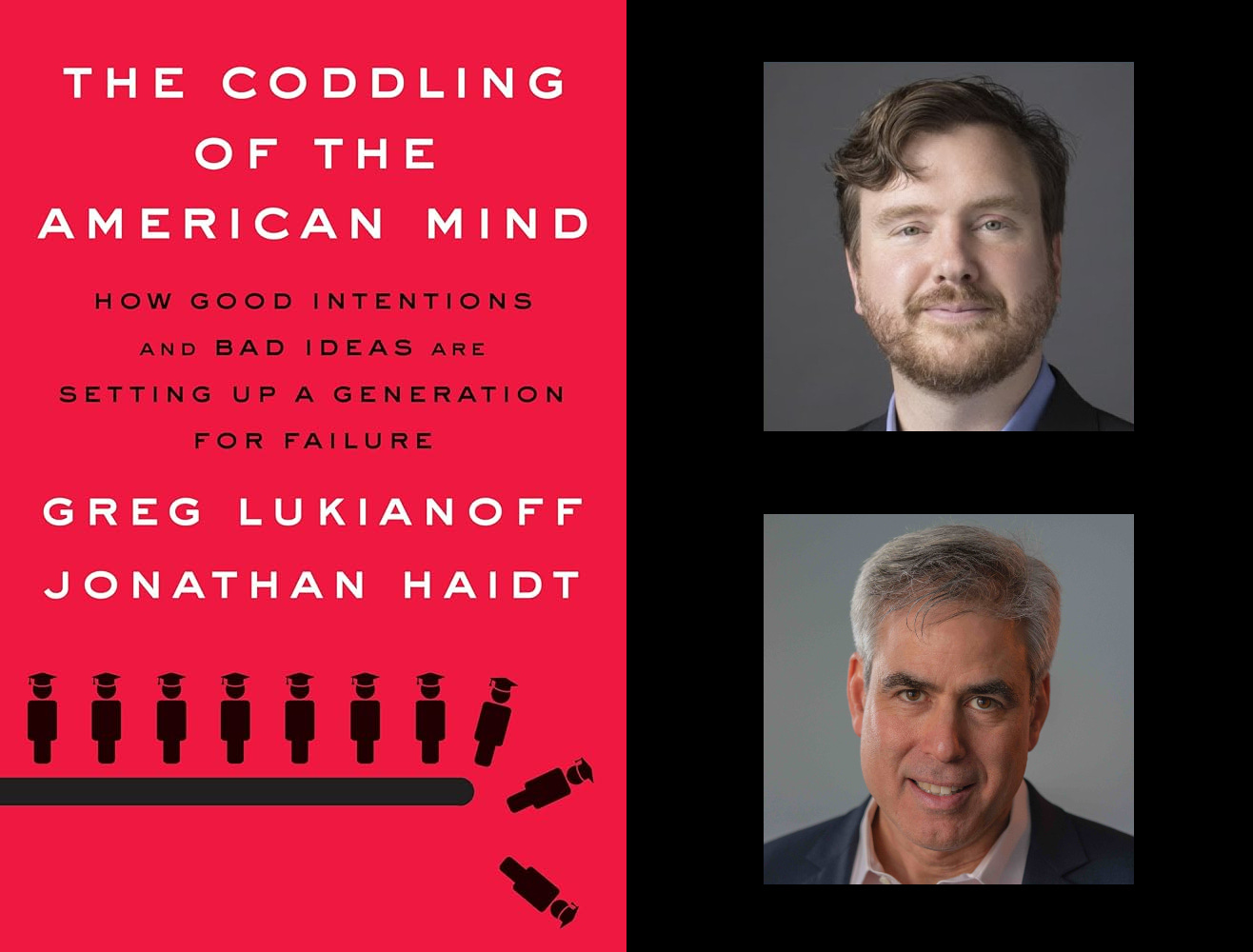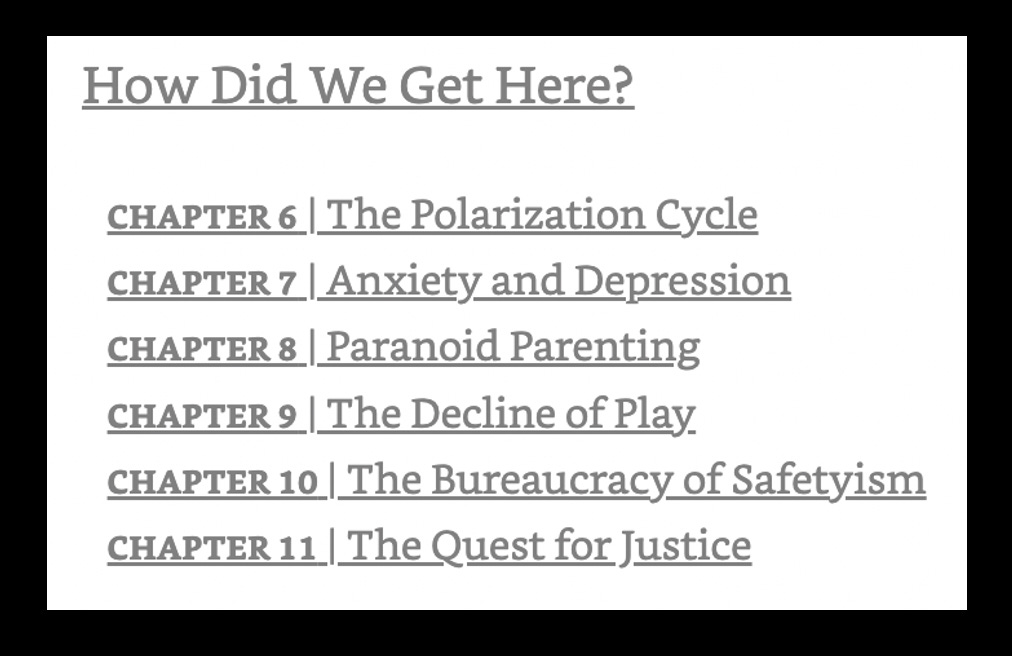What I’m Reading: The Coddling of the American Mind
The week before I went to Detroit for our New City Kids trip (here), I finally read a book that’s been sitting on my nightstand for about two years: The Coddling of the American Mind: How Good Intentions and Bad Ideas Are Setting Up a Generation for Failure by Greg Lukianoff & Jonathan Haidt.
This book became a bestseller in 2018 based on compelling analysis as to why college students became increasingly unable to participate in the free exchange of ideas. Instead, we saw the proliferation of safetyism, trigger-warnings, disinvitations, call-out culture, & speaker shoutdowns. Lukianoff & Haidt not only explain these terms and recount appalling instances of each, but they also lay out three “untruths” that serve as foundations for these troubling trends:
The Untruth of Fragility: “What doesn’t kill you makes you weaker.”
The Untruth of Emotional Reasoning: “Always trust your feelings.”
The Untruth of Us Versus Them: “Life is a battle between good people and evil people.”
In the face of these untruths, they propose that (1) we are built in such a way as to be antifragile, (2) we are full of cognitive distortions that need to be sorted out, and (3) we all possess the capacity to be good and evil. Even though neither Lukianoff & Haidt is a Christian, each of these three assertions has some theological merit!
After describing these realities, they use chapters 6-11 to trace “how we got here'“:
Although everyone will benefit from the analysis in these chapters, parents of young children will especially benefit from chapters 7 thru 9 since they highlight unintended consequences of care and concern.
Moreover, any follower of Jesus will be compelled by their differentiation between common-enemy identity politics and common-humanity identity politics. In the face of rising polarization, there is a great danger that we will abandon Christian principles and become downright militant in the expression of our beliefs. This causes us to treat others as enemies. While we do want to see “principalities and powers” as enemies, we do not need see people as enemies. Instead, our common humanity calls us to see the humanity in those with whom we disagree. We are called to draw upon that humanity come back to True North. (see more in Eph. 6:10-17 and Mt. 5:43-48)
So, what’s the solution?
In the final three chapters of the book, they recommend ways to “Wisen Up” through “Ch. 12 Wiser Kids,” “Ch. 13 Wiser Universities,” and “Conclusion: Wiser Societies.” I want to highlight one thing they are pushing for at universities: a renewal of the commitment to freedom of expression.
This hits especially close to home because as campuses have become more secular, it has become increasingly unacceptable to express theistic (Christian) ideas. Even though Lukianoff & Haidt are not advocates of Christianity, they are increasingly alarmed by the squashing of theistic or conservative ideas.
In that vein, they explore the telos of a university—i.e., it’s end goal or purpose. While I don't share their ultimate conclusion (I'm more in line with James KA Smith in Desiring the Kingdom), I do appreciate their analysis of one facet of the legacy of Karl Marx. He once critiqued the academy with these words: "The philosophers have only interpreted the world … the point is to change it." There are many who share Marx’s perspective that the goal of education is not truth, but rather social change/progress. In response, Lukianoff and Haidt disagree, writing:
"... the process by which we arrive at truth is easily corrupted by the desires of the seekers and the social dynamics of the community. If a university is united around a telos of change or social progress, scholars will be motivated to reach conclusions that are consistent with that vision, and the community will impose social costs on those who reach different conclusions—or who merely ask the wrong questions. There will always be inconvenient facts for any political agenda, and you can judge a university, or an academic field, by how it handles its dissenters." (p. 254)
In the face of such problems, they suggest that universities define themselves by a commitment to freedom of inquiry, even if the resultant truth is inconvenient. For instance, the NHS in the UK just published a report that is inconvenient for prevailing transgender ideology on most campuses (see here).
When it comes to freedom of expression, the pioneer is the University of Chicago, which has a long-standing commitment to allowing anyone, including Christians, make claims (under the assumption that any claimant will back up on their claims). Other elite schools like Harvard and Yale have developed reputations for squelching ideas that don’t fit the party line (i.e., secular, humanist, liberal, etc.).
In 2014, a special committee at UChicago articulated their ideas in a document that has come to be known as The Chicago Statement (read it here). On pp. 255-6, they suggest a modified version of The Chicago Statement that can serve as a template for any college or university:
The [UNIVERSITY]’s fundamental commitment is to the principle that debate or deliberation may not be suppressed because the ideas put forth are thought by some or even by most members of the [UNIVERSITY] community to be offensive, unwise, immoral, or wrong-headed. It is for the individual members of the [UNIVERSITY] community, not for [UNIVERSITY] as an institution, to make those judgments for themselves, and to act on those judgments not by seeking to suppress speech, but by openly and vigorously contesting the ideas that they oppose. Indeed, fostering the ability of members of the [UNIVERSITY] community to engage in such debate and deliberation in an effective and responsible manner is an essential part of [UNIVERSITY]’s educational mission.
Instead of abandoning institutions of higher learning as liberal graveyards, I believe Christians should actively participate while encouraging each institution to adopt statements like the template above. Since so many students and professors have already decided that theistic arguments are wrong-headed and that many parts of Biblical ethics are offensive and unwise, we need statements like these so that Christian perspectives receive consideration instead of being squashed.
Mind you, it’s not just elite universities that need to adopt this statement. There are many Christian institutions that do not live up to this standard. Few Christian students have encounters with ideas that the administration deems "offensive, unwise, immoral, or wrong-headed." The fear is that students will adopt such ideas as wise and welcome. However, sheltering students from ideas can become highly problematic because the individual student never learns to "openly and vigorously contest" ideas they ought to oppose.
Moreover, there is a danger that they won't develop the capacity to have productive disagreement with other Christians. Because, hey, let's not pretend that the wrong-headed ideas are only "out there." The Christian subculture is full of bad ideas. For instance, the CCLI Top 100 is full of songs with theologically-questionable ideas (read the full article at this link).
Many people think that the goal of education is knowledge acquisition. Based on that assumption, they try to fill the students’ heads with the right kind of knowledge. While that may be an appropriate goal of elementary education, the goal of the later, more mature stages of education should be to help students grow in wisdom, which involves critical thinking and the differentiation between good ideas and bad ideas … and in the process, defining what exactly constitutes ‘good’ and ‘bad’. For instance, you might think that wealth-acquisition and the avoidance of inconvenience are ‘good’ ideas. However, when you encounter Jesus and start to follow him, you are likely to change your views on those matters (and much more).
Ultimately, the goal of discipleship and formation is to glorify God and enjoy Him forever through love of God, self, and others. While this book doesn’t come close to reaching toward that goal, it does possess some compelling analysis that will help parents, college students, and the wider society. For those reasons, you might want to give it a read.
Or maybe, before you read it, you could start with an interview of Jonathan Haidt. He has given many, and they are easy to find on YouTube — click here.
.
What I’m Listening To: Civics as a Discipline
For a fun, related listen, check out the First Things podcast episode “Civics as a Discipline.” It’s a conversation with Jenna Silber Storey about the widespread, bipartisan concern that American universities are not adequately preparing students for citizenship.
.





